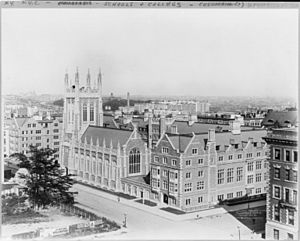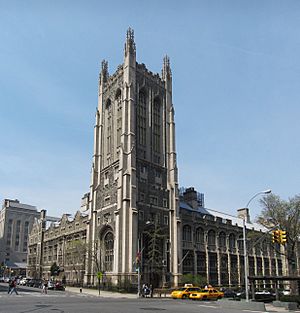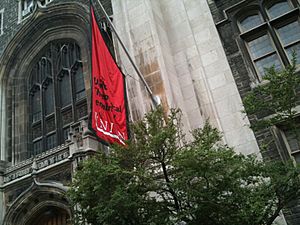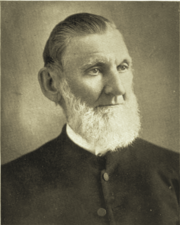Union Theological Seminary facts for kids
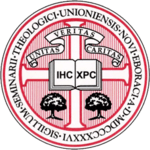
Seal of Union Theological Seminary
|
|
| Latin: Seminarium Theologicum Unioniense Novi Eboraci | |
|
Other name
|
Union Theological Seminary in the City of New York |
|---|---|
| Motto | Unitas, Veritas, Caritas (Latin) |
|
Motto in English
|
Unity, Truth, Love |
| Type | Private seminary |
| Established | 1836 |
| Endowment | 2.6 million (2019) |
| President | Serene Jones |
|
Academic staff
|
38 |
| Students | 210 |
| Location |
,
,
United States
|
|
Union Theological Seminary
|
|
| Location | W. 120th St. and Broadway, New York, NY 10027 |
| Area | 2.3 acres (0.93 ha) |
| Built | 1908 |
| Architect | Allen & Collens |
| Architectural style | Late Gothic Revival, Collegiate Gothic |
| NRHP reference No. | 80002725 |
| Significant dates | |
| Added to NRHP | April 23, 1980 |
Union Theological Seminary in the City of New York (often called UTS or Union) is a special kind of private school. It is a seminary, which means it teaches people about religion and prepares them for religious leadership. UTS is located in Morningside Heights, Manhattan, New York City.
It works closely with Columbia University, one of the biggest universities in the United States. Since 1928, UTS has been Columbia's main school for studying theology, which is the study of religious faith and practice. Even though it's connected to Columbia, UTS runs itself and has its own leaders. It also works with the Jewish Theological Seminary of America.
UTS is the oldest independent seminary in the United States. It is known for its progressive Christian ideas. Many important thinkers have studied or taught there. It was started in 1836 by members of the Presbyterian Church. But it welcomed students from all different Christian groups.
In 1893, UTS decided to become fully independent. This meant the Presbyterian Church could no longer choose who taught there. In the 1900s, Union became a major center for liberal Christianity. It helped start new ways of thinking about religion, like Black theology and womanist theology. UTS also has one of the biggest religious libraries in the Western Hemisphere, called the Burke Library at Union Theological Seminary.
Contents
History of Union Theological Seminary
How it Started
Union Theological Seminary was founded in 1836. By the late 1800s, it became a top place for liberal Christianity in the U.S. In 1891, a professor named Charles A. Briggs gave a speech that questioned some traditional religious beliefs. The Presbyterian Church disagreed with his ideas.
Because of this, Union decided to become independent from the church's control. This made it free to teach what it believed was important. Another school, the Auburn Theological Seminary, moved to Union's campus in 1939. It stayed there until 2014.
Many famous people graduated from UTS. These include the historian Arthur McGiffert and the Socialist leader Norman Thomas.
Union Settlement: Helping the Community
In 1895, some former students of Union Theological Seminary started something special. They created the Union Settlement Association. This was one of the first "settlement houses" in New York City.
A settlement house is a place where people live and work in a neighborhood to help its residents. The idea was to learn about the problems people faced and offer support. The alumni were inspired by similar places in London and Chicago. They wanted to help the East Harlem neighborhood, which had many new buildings but few services.
William Adams Brown, a professor at Union, said they wanted to "grow up with the community." Union Settlement still helps people in East Harlem today. It offers many programs like early childhood education, youth activities, and job training. It serves over 13,000 people each year.
From the 1900s to Today
In the middle of the 1900s, two important thinkers, Reinhold Niebuhr and Paul Tillich, taught at UTS. They made the school a major center for new religious ideas. Later, famous public speaker Cornel West also started his career at UTS in 1977.
Over time, the school faced money problems. It decided to rent some of its buildings to Columbia University. It also gave its large library, the Burke Library, to Columbia. These agreements helped UTS become financially stable again.
On July 1, 2008, Serene Jones became the first woman president of UTS. This was a big moment in the school's 172-year history. In 2014, President Jones announced that UTS would stop investing in fossil fuel companies. This was a protest against the harm these companies cause to the environment. In 2024, UTS also decided to stop investing in companies that profit from the war in Palestine.
New classrooms and faculty spaces were added to UTS in the early 2020s. This was part of building Claremont Hall, a tall residential building nearby. UTS now owns 27 apartments in this new building.
Even though UTS is independent, it stays connected to Columbia University. A faculty member and a student from UTS are part of Columbia's main governing body, the University Senate.
Campus Life
The UTS campus is in the Morningside Heights area of Manhattan, New York City. It is surrounded by Claremont Avenue, Broadway, and West 120th and 122nd Streets. The buildings are made of brick and limestone. They are designed in a style called English Gothic revival architecture, completed in 1910. The main tower looks like a part of the famous Durham Cathedral in England.
UTS is next to several other important schools. These include Teachers College, Barnard College, the Jewish Theological Seminary of America, and the Manhattan School of Music. Students at Union can take classes at these schools and use their libraries.
The main building was added to the National Register of Historic Places in 1980. Parts of it were also named a New York City designated landmark in 1965. Some parts of the campus are now rented out to Columbia University.
The Burke Library
The Burke Library at Union Theological Seminary is one of the largest religious libraries in North America. It has over 700,000 items. The library has many special and rare collections. These include ancient Greek records from 20 CE and a rare book from the 1100s. It also has one of the first hymnals (songbooks) for African-Americans, published in 1818.
The Burke Library also keeps important historical records. These include archives about women in religious scholarship and missionary research.
In 2004, the Burke Library became part of the Columbia University Libraries system. This system has over 14 million books and other items. The library is named after Walter Burke, who gave a lot of money to the library and led the Seminary's board.
Teachers at Union Theological Seminary
Many famous religious thinkers have taught at Union Theological Seminary.
Reinhold Niebuhr and Paul Tillich were two very important teachers. Niebuhr joined in 1929. Tillich came in 1933 after he was forced to leave Germany by the Nazis. He narrowly escaped arrest and came to UTS.
In 1930, Dietrich Bonhoeffer was a student and teacher at the seminary. He returned in 1939 to escape the Nazis again. But he soon felt he had to go back to Germany to resist them. He was involved in a secret plan to overthrow Hitler. Because of this, he was executed in 1945, just before the war ended.
James Hal Cone, a founder of liberation theology and Black theology, started teaching at Union in 1970. He taught there until he passed away in 2018.
Serene Jones became the first woman president of the seminary in 2008. Cornel West, a well-known civil rights activist and thinker, joined the faculty in 2012 and again in 2021.
Current Teachers
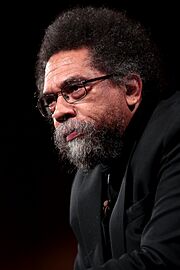
- Mary C. Boys – Teaches about practical theology.
- David M. Carr – Teaches about the Old Testament.
- Euan Cameron – Teaches about the history of the Reformation.
- Alan Cooper – Teaches about the Bible. He is the first person to teach at both Union and the Jewish Theological Seminary.
- Pamela Cooper-White – Teaches about psychology and religion.
- Kelly Brown Douglas – Dean of the Episcopal Divinity School at Union.
- Gary Dorrien – Teaches about social ethics.
- Roger Haight – A visiting professor of theology.
- Esther J. Hamori - Teaches about the Hebrew Bible.
- Brigitte Kahl – Teaches about the New Testament.
- Chung Hyun Kyung – Teaches about ecumenical theology (working together across different Christian groups).
- Aliou C. Niang - Teaches about the New Testament.
- Jerusha T. Rhodes - Teaches about Islam and how different religions interact.
- Kosen Greg Snyder - Teaches about Buddhist Studies.
- John J. Thatamanil – Teaches about theology and world religions.
- Cornel West – Teaches about religious philosophy and Christian practice.
- Andrea C. White – Teaches about theology and culture.
- Jason Wright – A member of the Board of Trustees.
Some teachers from Union also teach at other nearby schools. These include Columbia University, Teachers College, Columbia University, New York Theological Seminary, and the Jewish Theological Seminary of America.
Past Teachers
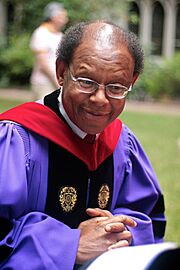
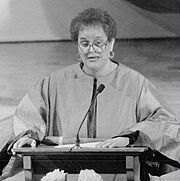
- Michelle Alexander – A writer and civil rights activist.
- Charles Augustus Briggs – A professor who was important in the Modernist movement.
- Raymond E. Brown – The first Catholic professor to gain tenure at Union.
- Henry Sloane Coffin – A former president of Union.
- James Hal Cone – A founder of Black theology.
- Harry Emerson Fosdick – The first minister of Riverside Church and a professor.
- Beverly Wildung Harrison – A Christian feminist ethicist and the first woman president of the North American Society of Christian Ethics.
- Reinhold Niebuhr – A very influential thinker on Christian social ethics. He wrote the famous The Nature and Destiny of Man and the Serenity Prayer.
- Paul Tillich – A German-American theologian and philosopher.
- Phyllis Trible – A feminist biblical scholar.
- Delores S. Williams – A womanist theologian.
- Walter Wink – A biblical scholar and activist.
Notable Former Students
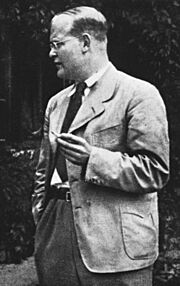
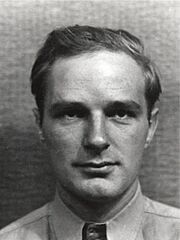
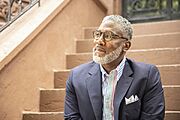
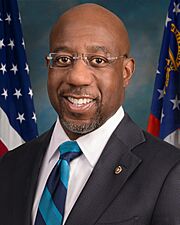
Many people who went on to do great things studied at Union Theological Seminary.
- Dietrich Bonhoeffer – A German theologian who resisted the Nazis.
- Marcus Borg – A biblical scholar and author.
- Malcolm Boyd – An Episcopal priest and author who was active in civil rights.
- Frederick Buechner – A writer, novelist, and Presbyterian minister.
- Calvin Otis Butts III – A senior pastor of the historic Abyssinian Baptist Church in New York City.
- David Dellinger – A famous American peace activist.
- Helen Flanders Dunbar – An early leader in psychosomatic medicine (how the mind affects the body).
- Harry Emerson Fosdick – The first minister of Riverside Church.
- Mark Hanson – A former leader of the Evangelical Lutheran Church in America.
- Myles Horton – A co-founder of the Highlander Center, which worked for social justice.
- William H. Hudnut III – A former Mayor of Indianapolis, Indiana.
- Suzan Johnson Cook – A former U.S. Ambassador for International Religious Freedom.
- Rollo May – A well-known psychologist.
- Reinhold Niebuhr – An influential theologian and author.
- Paul Raushenbush – A minister and religion editor for The Huffington Post.
- Joseph L. Roberts Jr. – A senior pastor of Atlanta's Ebenezer Baptist Church.
- Carl Rogers – A pioneering psychologist.
- John Sung – A Chinese Christian evangelist who led a revival movement.
- Norman Thomas – A socialist leader.
- Conrad Tillard – A Baptist minister, radio host, and politician.
- Phyllis Trible – A feminist biblical scholar.
- Raphael Warnock – A U.S. Senator from Georgia and senior pastor at Ebenezer Baptist Church.
- Delores S. Williams – A womanist theologian.
- Walter Wink – A biblical scholar and activist.
See also
 In Spanish: Seminario Teológico Unión (Nueva York) para niños
In Spanish: Seminario Teológico Unión (Nueva York) para niños
 | Jewel Prestage |
 | Ella Baker |
 | Fannie Lou Hamer |






